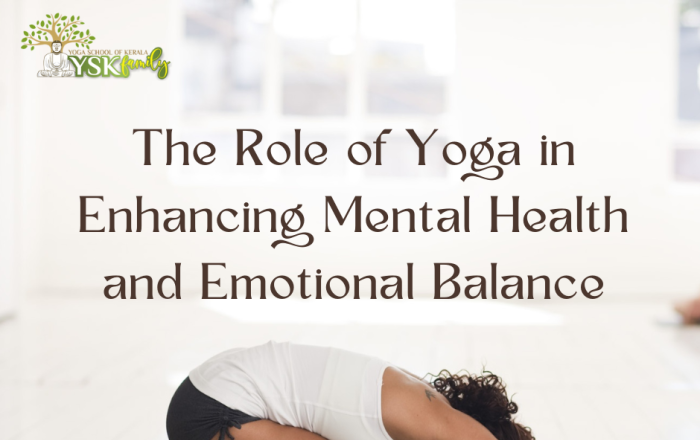
Blog

Blog
In an era where stress, anxiety and emotional unrest are increasingly common, the ancient practice of yoga offers a holistic approach to cultivating mental wellness and restoring emotional balance. While yoga is often associated with flexibility and fitness, its true power lies in its ability to integrate body, mind and spirit, providing profound psychological benefits that modern science is only beginning to fully understand.
In this blog, we will explore how yoga influences mental health, the science behind it, emotional benefits, key practices and how to integrate yoga into daily life for long-lasting well-being.
Understanding Mental Health and Emotional Balance
Before diving into the role of yoga, it's important to understand the basics:
-
Mental health refers to our emotional, psychological and social well-being. It affects how we think, feel and act, and determines how we handle stress, relate to others and make decisions.
-
Emotional balance is the ability to maintain equilibrium in our emotions—neither being overwhelmed by negative emotions nor suppressing them. It's about resilience, awareness, and regulation.
Mental health conditions like anxiety, depression, PTSD and burnout are rising globally. According to the World Health Organization (WHO), over 264 million people suffer from depression alone. The need for non-invasive, natural and sustainable solutions has never been more urgent—and this is where yoga shines.
Yoga: More Than Just Exercise
Yoga, which originated in India over 5,000 years ago, is a comprehensive system that includes:
-
Asanas (physical postures)
-
Pranayama (breathing techniques)
-
Dhyana (meditation)
-
Yamas and Niyamas (ethical disciplines)
-
Mantras and Mudras (sound and gestures)
These elements work synergistically to nurture the nervous system, calm the mind and create emotional stability. Unlike many modern treatments that focus on symptoms, yoga promotes inner harmony and self-awareness.
Scientific Evidence: Yoga and Mental Health
1. Yoga Reduces Stress and Anxiety
Numerous studies have shown that yoga decreases the levels of cortisol, the primary stress hormone. Breathing exercises like Nadi Shodhana and Ujjayi Pranayama activate the parasympathetic nervous system, promoting relaxation.
A study published in Journal of Clinical Psychology found that individuals who practiced yoga three times a week for two months reported a significant drop in anxiety symptoms compared to a control group.
2. Improves Mood and Reduces Depression
Yoga boosts the production of serotonin and dopamine, neurotransmitters responsible for feelings of happiness and pleasure. Hatha yoga and Kundalini yoga have been found effective in reducing symptoms of mild to moderate depression.
Research from Harvard Medical School supports that consistent yoga practice leads to increased gray matter in the brain areas linked to emotional regulation and happiness.
3. Promotes Better Sleep
Insomnia and poor sleep can worsen mental health. Yoga practices like Yoga Nidra and restorative yoga calm the body and mind, making it easier to fall and stay asleep.
A study in Sleep Medicine Reviews highlighted that yoga practitioners experience better sleep quality, sleep duration, and sleep efficiency.
4. Increases Mindfulness and Self-Awareness
Meditative aspects of yoga enhance mindfulness, which is the ability to stay present and engaged. This helps individuals recognize negative thought patterns and cultivate more positive mental habits.
Emotional Benefits of Yoga
-
Emotional Regulation
Yoga teaches techniques to pause, reflect, and respond rather than react. This helps in managing anger, grief, jealousy, and fear more constructively.
-
Builds Resilience
Through challenges in poses and breath control, yoga fosters mental toughness and resilience—key qualities for navigating emotional upheavals.
-
Boosts Self-Esteem and Confidence
As practitioners progress in their physical and meditative practices, they develop a sense of achievement and self-worth, which directly boosts emotional well-being.
-
Enhances Empathy and Compassion
Yoga philosophies like Ahimsa (non-violence) and Karuna (compassion) help practitioners become more empathetic towards others and themselves.
-
Facilitates Emotional Release
Stored emotions, especially trauma, are believed to reside in the body. Poses like hip openers (e.g., Pigeon Pose) can trigger emotional release and healing.
Key Yoga Practices for Mental and Emotional Well-being
1. Asanas (Postures)
-
Child’s Pose (Balasana) – Calms the nervous system.
-
Bridge Pose (Setu Bandhasana) – Opens the heart and combats depression.
-
Legs-Up-the-Wall Pose (Viparita Karani) – Relieves anxiety and fatigue.
-
Tree Pose (Vrikshasana) – Promotes mental focus and grounding.
2. Pranayama (Breathing Techniques)
-
Anulom Vilom (Alternate Nostril Breathing) – Balances both brain hemispheres.
-
Bhramari (Humming Bee Breath) – Calms the mind instantly.
-
Kapalabhati (Skull Shining Breath) – Energizes and uplifts mood.
3. Meditation and Mindfulness
-
Loving-Kindness Meditation – Cultivates self-love and compassion.
-
Body Scan Meditation – Enhances awareness and relaxes the body.
-
Chakra Meditation – Balances energy centers linked with emotions.
4. Yoga Nidra (Yogic Sleep)
A guided form of meditation that takes you into deep relaxation while remaining conscious. It's particularly effective for treating PTSD and chronic anxiety.
The Spiritual Dimension: Connecting With the Inner Self
Yoga encourages us to go beyond the ego, connecting with our higher self or inner consciousness. This deepens emotional maturity and creates a sense of purpose and peace. Practices like Jnana Yoga (yoga of wisdom) and Bhakti Yoga (yoga of devotion) help build emotional strength through surrender and spiritual insight.
How to Integrate Yoga Into Your Daily Life
-
Start Small and Stay Consistent
Even 15–20 minutes a day can create noticeable improvements in mood and mental clarity.
-
Create a Safe Space
A quiet, distraction-free environment enhances the quality of your practice.
-
Use Guided Resources
Beginners can benefit from apps, YouTube channels, or local instructors to stay motivated.
-
Practice Journaling Post-Yoga
Reflecting on your thoughts after yoga can enhance emotional processing.
-
Combine with Healthy Habits
Complement yoga with a balanced diet, adequate sleep, and social connections for holistic mental health.
Yoga in Therapy and Mental Health Treatment
Yoga Therapy is now being integrated into psychological treatment plans around the world. Psychologists and psychiatrists often recommend yoga as a complementary therapy for:
-
Generalized Anxiety Disorder (GAD)
-
Depression
-
Attention Deficit Hyperactivity Disorder (ADHD)
-
Post-Traumatic Stress Disorder (PTSD)
-
Eating Disorders
In fact, many mental health clinics now offer Yoga-Based CBT (Cognitive Behavioral Therapy) sessions for deeper healing.
In a world that often prioritizes productivity over peace, yoga offers a much-needed pause, a breath, and a pathway back to ourselves. Its power to enhance mental health and emotional balance is not just anecdotal but supported by science, traditions, and lived experiences across cultures.
Whether you're battling anxiety, seeking emotional stability, or simply looking for a deeper sense of connection, yoga can be your ally. It doesn’t demand perfection—it invites presence. Every breath, every stretch, every moment on the mat is an opportunity to heal, grow, and thrive.
Ready to Begin?
If you're new to yoga, start simple. A few deep breaths and a gentle stretch can be the beginning of a transformative journey. And if you're already practicing—go deeper. Experience the true essence of yoga at Yoga School of Kerala, where ancient wisdom meets modern wellness. Reconnect with your inner self, achieve emotional balance and build lifelong habits for physical and mental well-being. Join Yoga School of Kerala today—where transformation begins from within.


